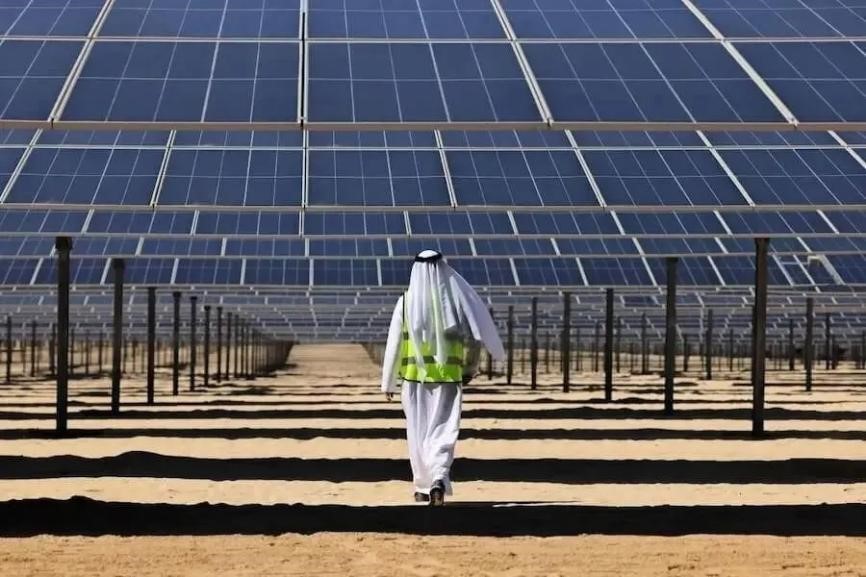With the continuous evolution of the global energy structure, clean energy has gradually become an important direction for the development of all countries. In line with this megatrend, Chinese solar companies are actively expanding their business in the Middle East, striving to build a full industry chain ecosystem from raw material supply to product sales. This not only satisfies the strong demand for sustainable energy in the Middle East, but also brings huge market potential and technological innovation opportunities for Chinese enterprises. China Exportsemi Web will discuss in detail the expansion strategies of Chinese solar companies in the Middle East market and analyze their far-reaching impact on the global energy market landscape.
The Middle East layout of Chinese solar companies
In recent years, Chinese solar companies have been investing and cooperating more in the Middle East. At the 3rd Belt and Road Forum for International Cooperation in October 2023, a number of domestic companies signed contracts with Middle Eastern companies to cooperate in the construction of polysilicon, wafers, cells, modules, brackets, and power stations. For example, JinkoSolar signed a 3.8GW module agreement with ACWA Power, and TCL Zhonghuan signed a Joint Development Agreement with Vision Industries to promote the joint construction of crystal wafer projects in Saudi Arabia.

Figure: Chinese solar companies accelerate expansion in the Middle East
Technological innovation and industrial chain integration
The expansion of Chinese solar companies in the Middle East is not only a simple transfer of production capacity, but also a process of technological innovation and industrial chain integration. In 2021, the efficiency of crystalline silicon cell laboratories of enterprises and research institutions in the photovoltaic power generation industry broke records 11 times, promoting the rapid improvement of the level of key indicators in all links. This technological innovation not only enhances the competitiveness of Chinese solar companies, but also provides strong technical support for the energy transition in the Middle East.
Potential and challenges of the Middle East market
According to Infolink Consulting, a photovoltaic consulting agency, in 2023, the Middle East PV demand will be about 20.5GW-23.6GW, and the market led by Turkey, Saudi Arabia and U.A.E. has increased significantly. However, PV projects in the Middle East also face the dual challenges of high technical requirements and low tender prices. Photovoltaic power plants in the Middle East are often built in remote deserts, and the accumulation of wind and sand seriously affects the power generation efficiency of photovoltaic modules. In addition, the bidding price in the Middle East market has repeatedly hit new lows in the industry, making the PV price war even more brutal.
Diversified investment in Chinese companies
The investment of Chinese solar companies in the Middle East is not limited to photovoltaic power generation, but also covers energy storage, wind power and other fields. For example, Envision Technology Group announced that it will establish a wind power equipment joint venture in Saudi Arabia with Saudi Arabia's public investment funds PIF and VI. In addition, Sungrow signed the world's largest energy storage project with ALGIHAZ in Saudi Arabia, with a capacity of up to 7.8GWh, and will deploy more than 1,500 sets of PowerTitan2.0 liquid-cooled energy storage systems. These diversified investments not only demonstrate the technological strength of Chinese companies, but also reflect their diversified layout in the global energy market.
Policy support and market opportunities
Policy support in China and the Middle East provides a solid foundation for solar companies to expand. The Chinese government has further promoted the adoption of PV technology through various policies such as subsidies, tax incentives, and renewable energy quotas. Middle Eastern countries such as Saudi Arabia launched the "Vision 2030" and "2020 National Transformation Plan", proposing to vigorously develop natural gas and new energy. The implementation of these policies provides a broad market space and policy support for solar energy enterprises.
Epilogue
The expansion of Chinese solar companies in the Middle East is not only a response to the energy demand of the Middle East, but also a reflection of the technological innovation and industrial chain integration of Chinese enterprises. Despite the dual challenges of technology and market, with the support of policies in China and the Middle East, Chinese solar companies are expected to build a more complete green energy ecosystem in the Middle East and promote the process of global energy transition.






